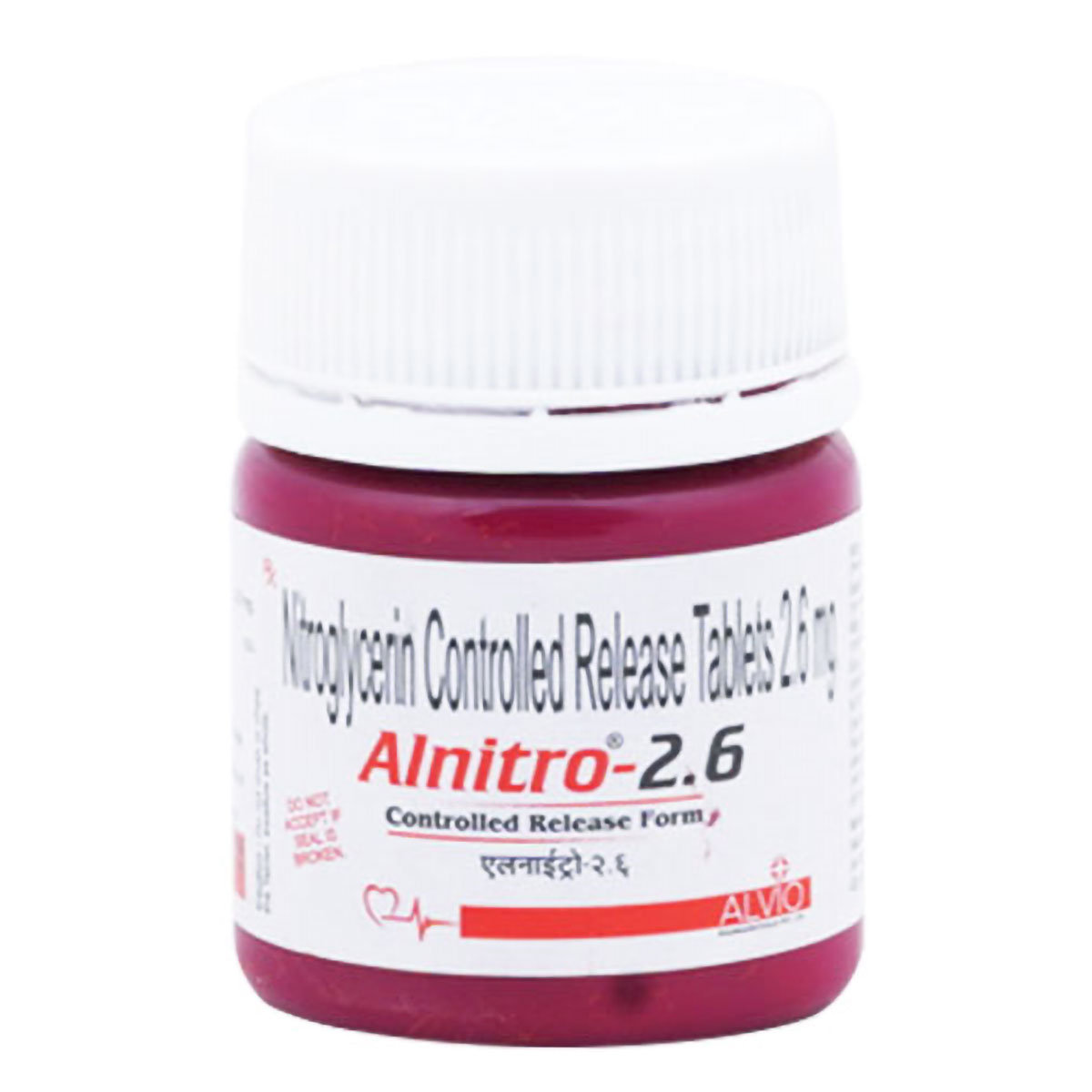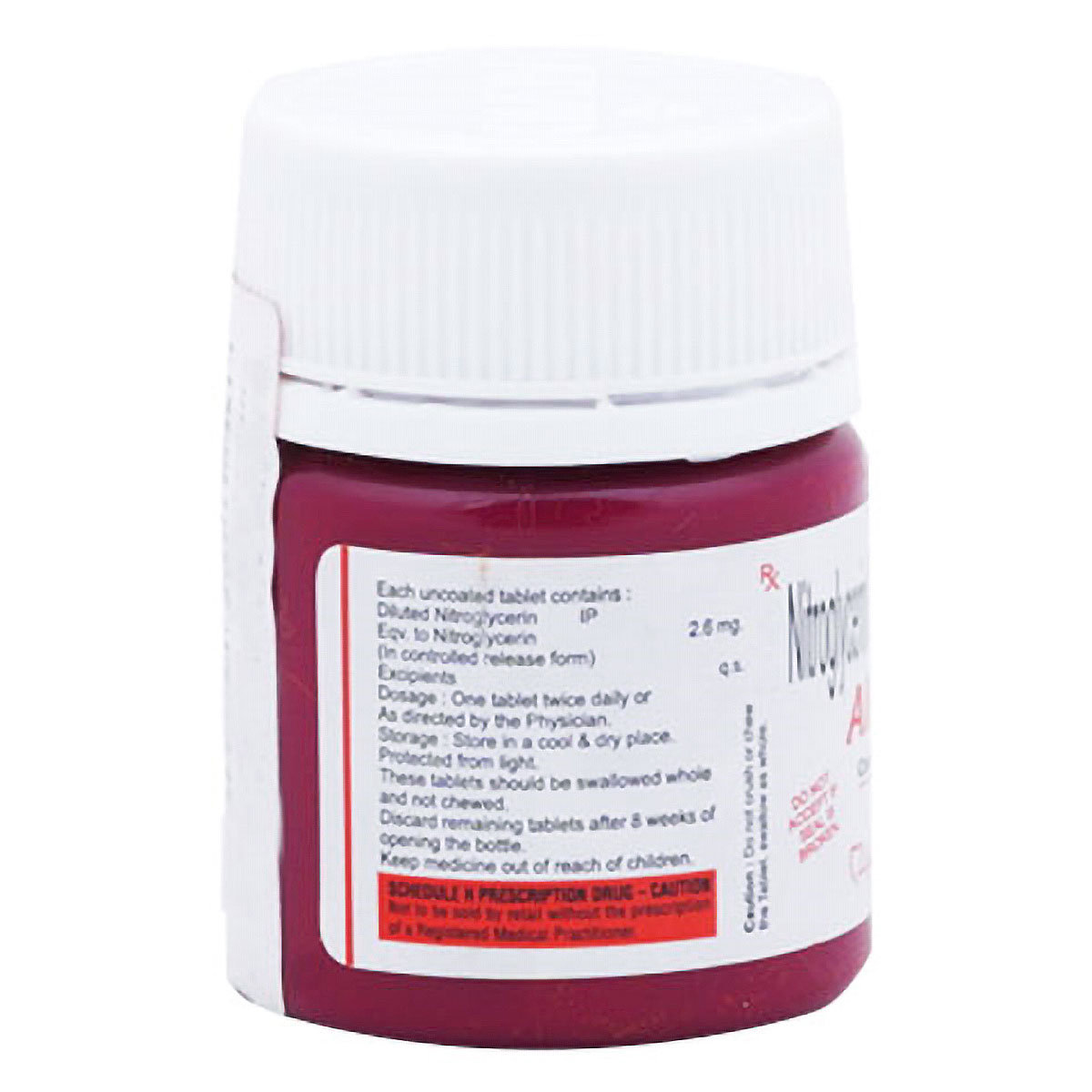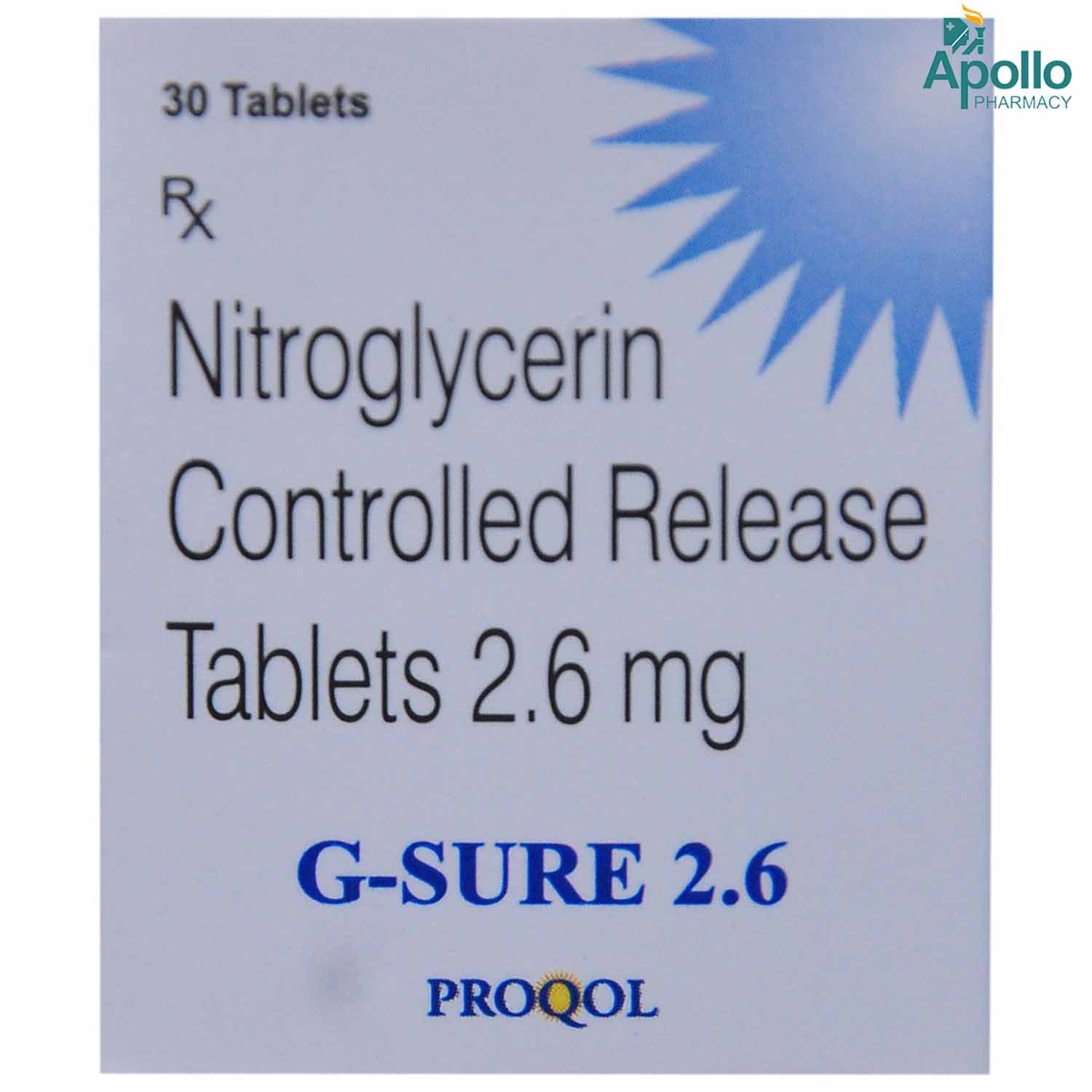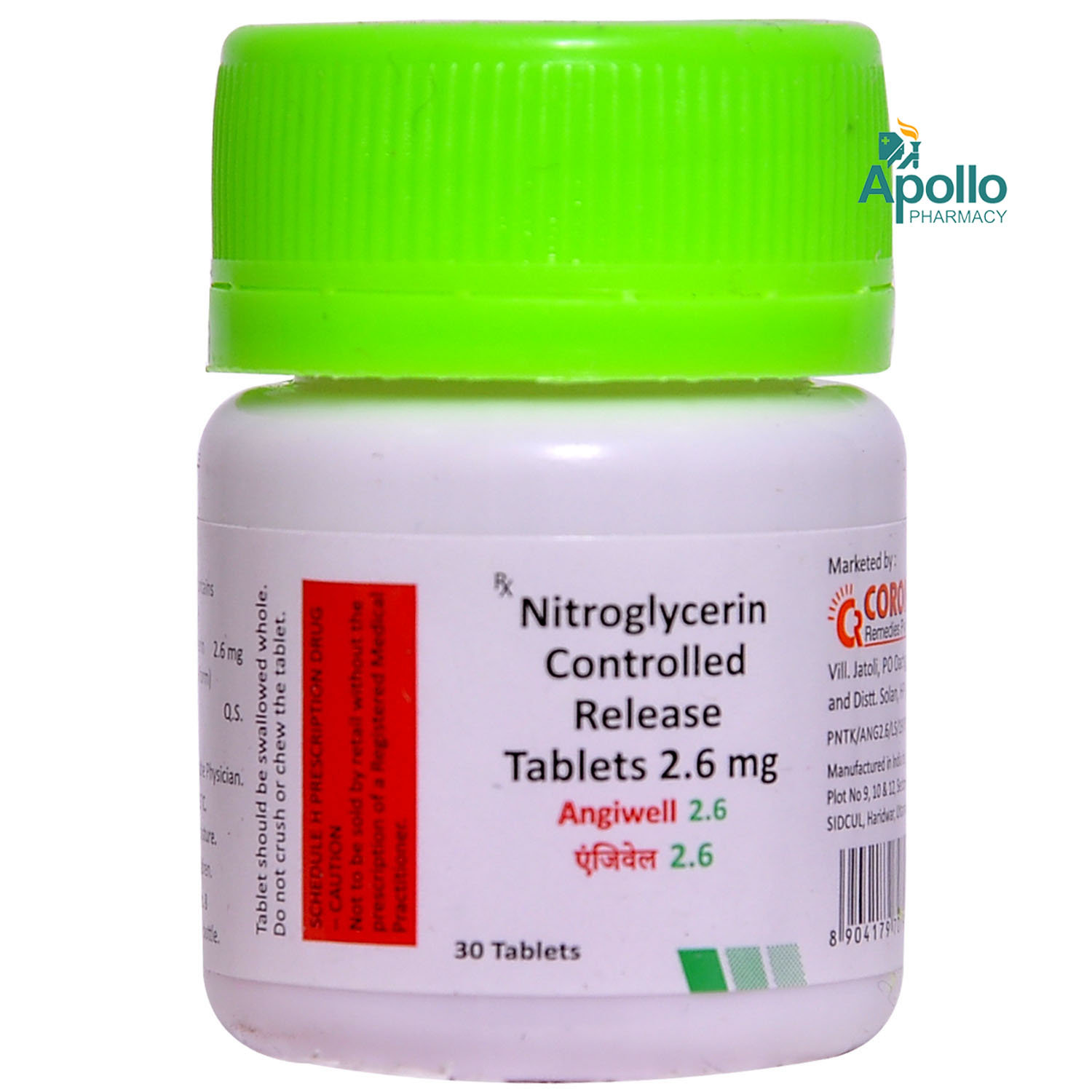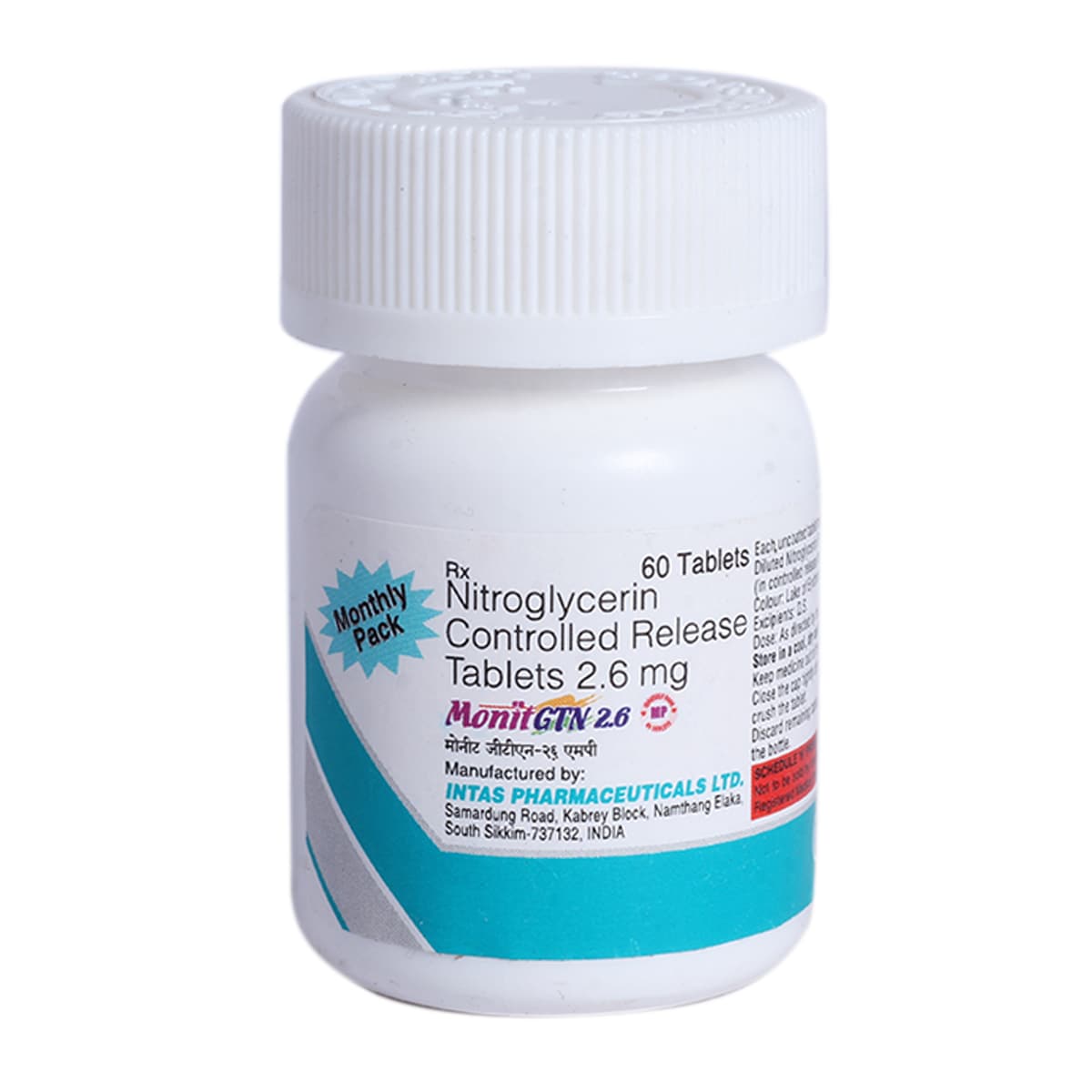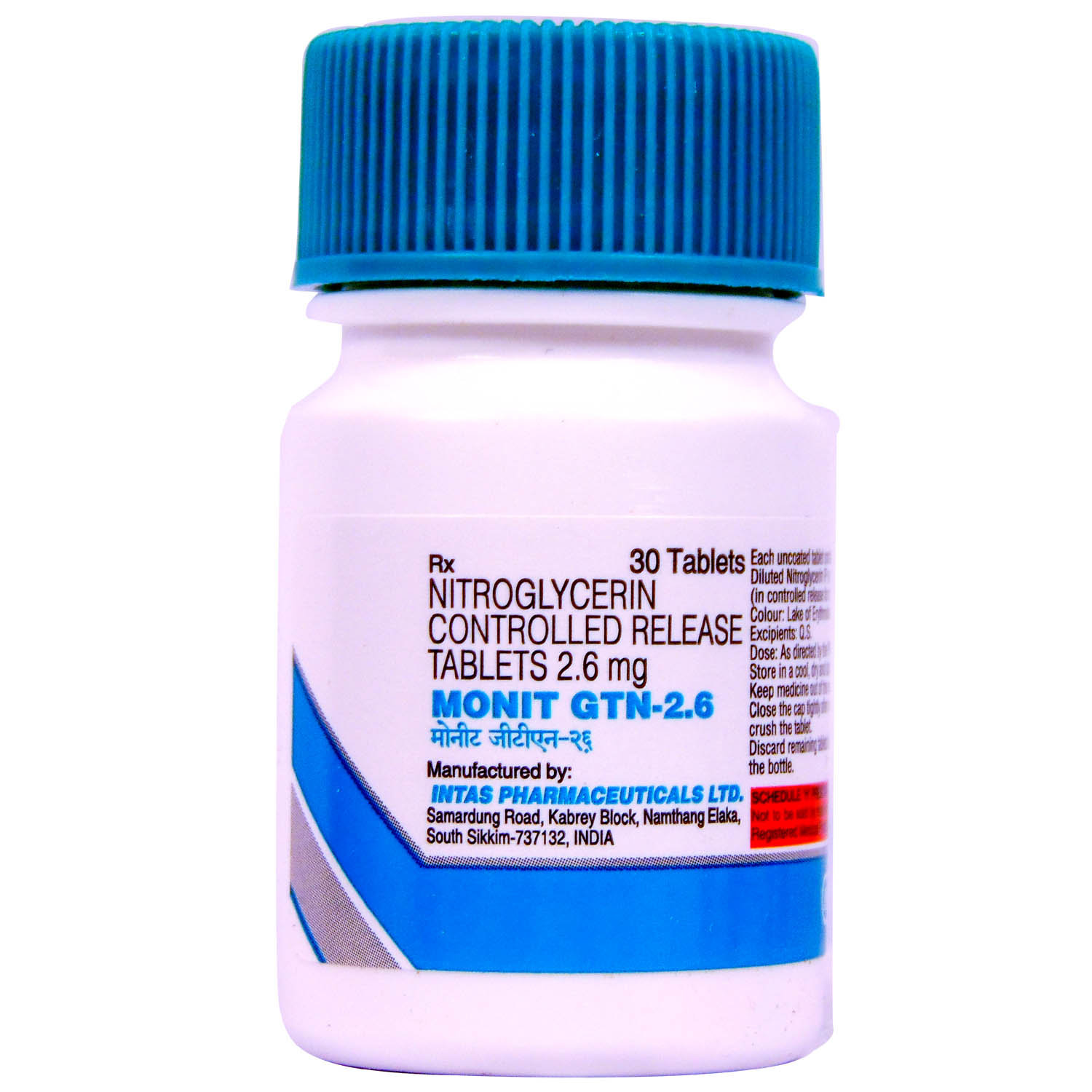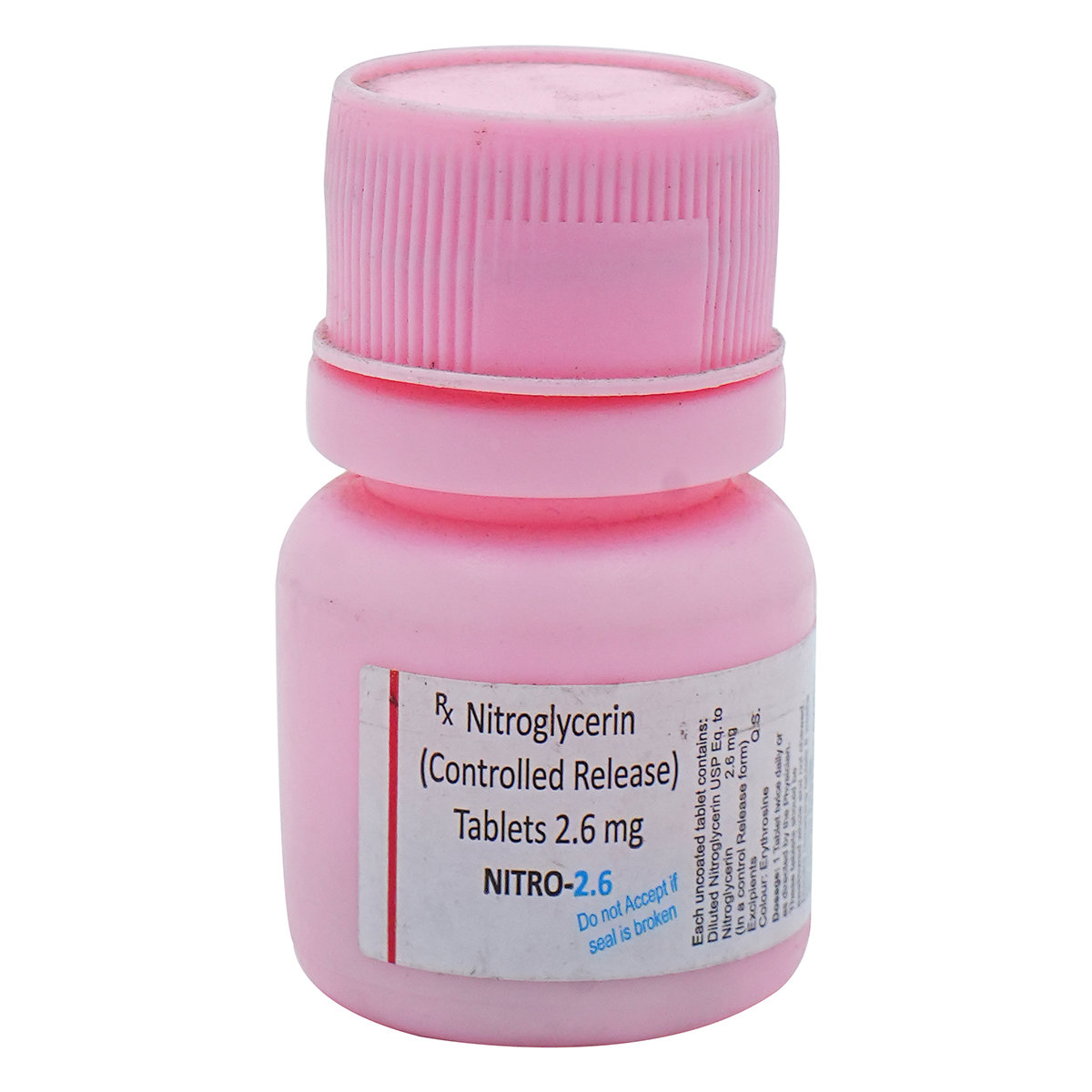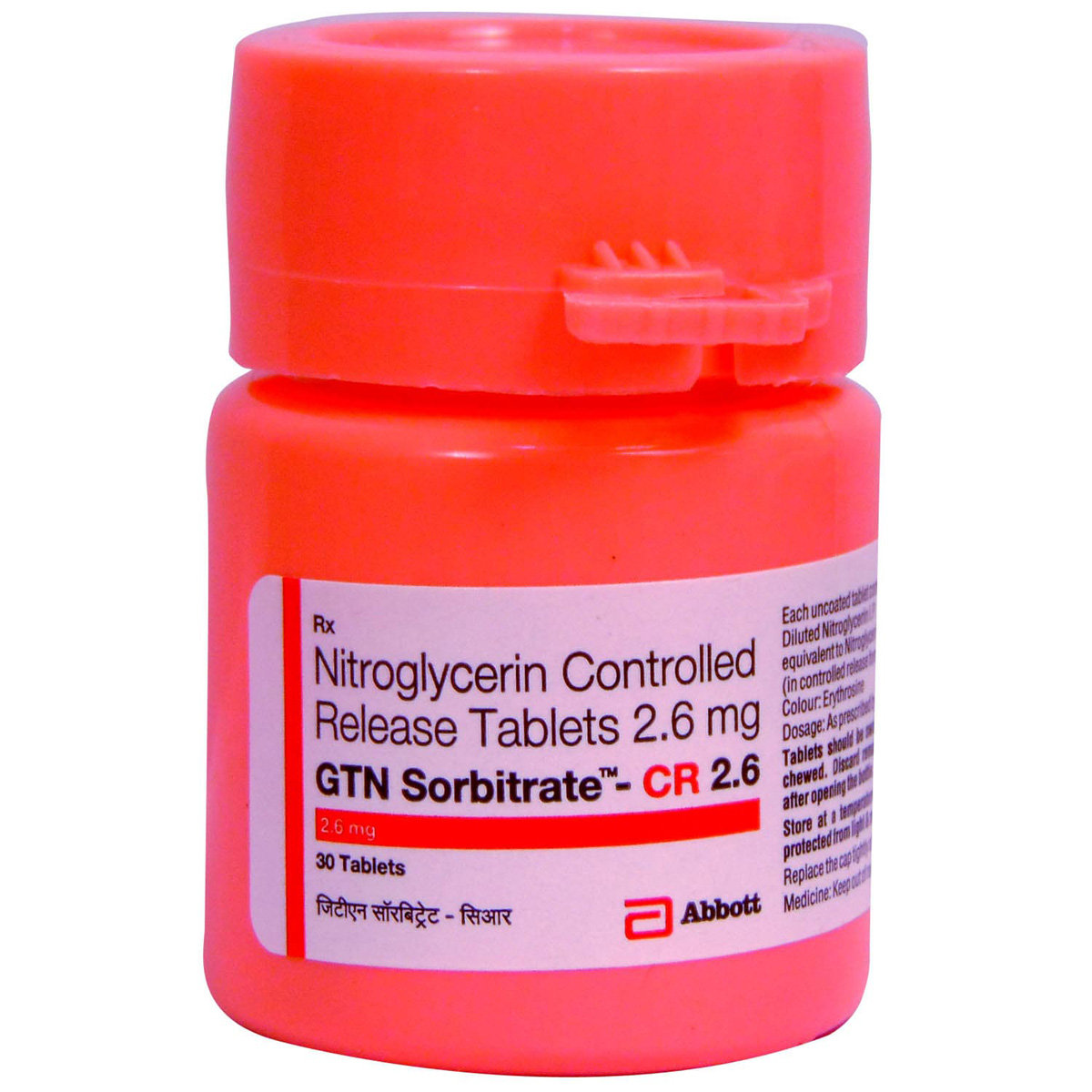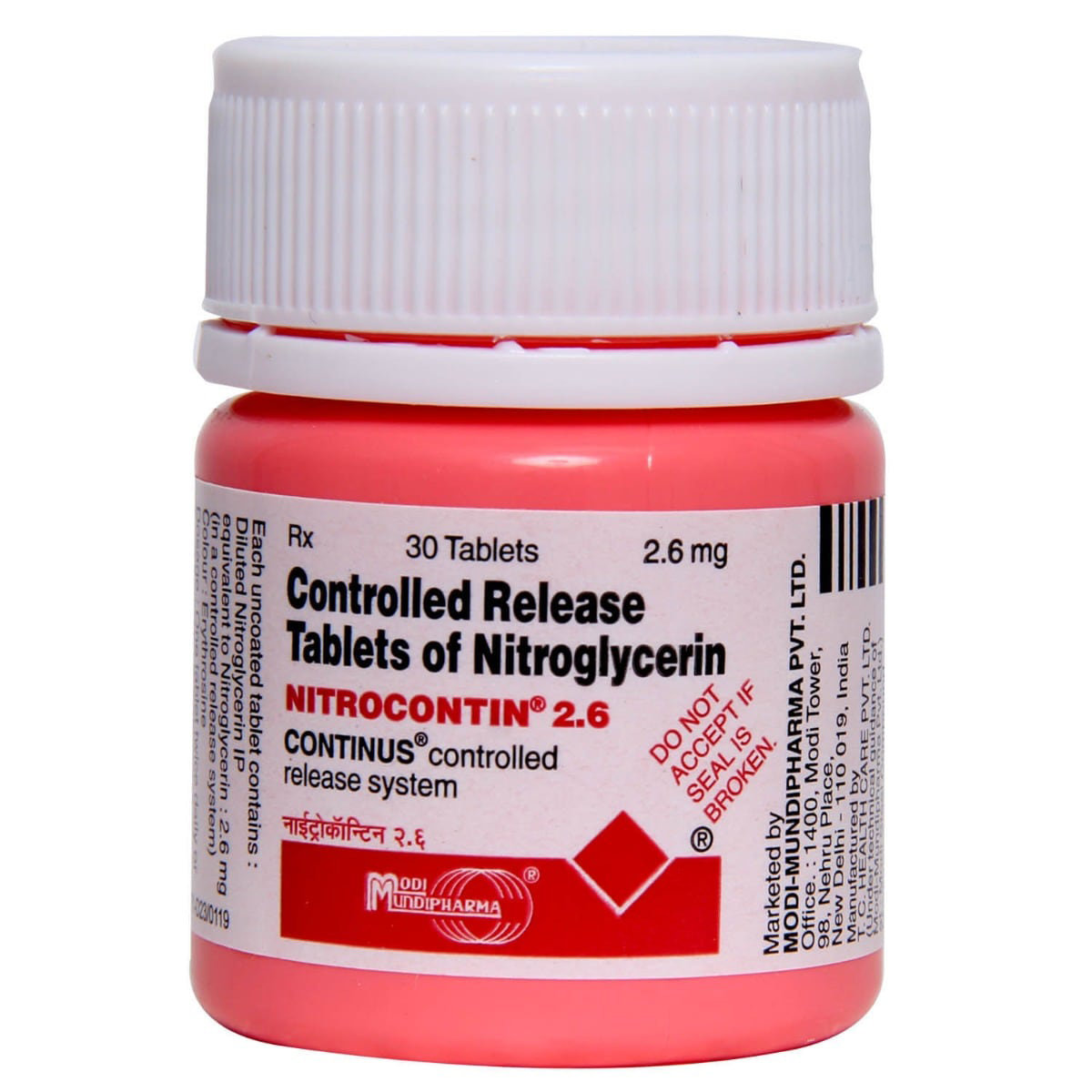Alnitro-2.6 Tablet 30's
MRP ₹224.5
(Inclusive of all Taxes)
₹33.7 Cashback (15%)
Provide Delivery Location
Online payment accepted
 Prescription drug
Prescription drugWhats That
Composition :
Manufacturer/Marketer :
Consume Type :
Expires on or after :
Return Policy :
About Alnitro-2.6 Tablet
Alnitro-2.6 Tablet belongs to the class of anti-anginal medication, primarily used to prevent angina attacks (chest pain) and treatment of angina. Angina occurs when the heart does not get a sufficient amount of oxygen.
Alnitro-2.6 Tablet contains Nitroglycerin, a natural vasodilator that works by expanding blood vessels (veins and arteries). This boosts the blood supply to your heart, allowing more oxygen to reach your heart muscles and reducing chest pain. As a result, it reduces heart workload and prevents attacks of angina.
Alnitro-2.6 Tablet is taken with or without food in a dose and duration as advised by the doctor. Your dose will depend on your condition and how you respond to Alnitro-2.6 Tablet . Sometimes, you may experience dry mouth, headache, blurred vision, insomnia, tingling, and prickling sensation. Most of these side effects of Alnitro-2.6 Tablet are temporary, do not require medical attention, and gradually resolve over time. However, if the side effects are persistent, reach out to your doctor.
Consume only if the doctor prescribes you. Never encourage self-medication or suggest your medicine to someone else. You should not take Alnitro-2.6 Tablet if you are allergic to nitrates or any of its ingredients or are taking medication for hypertension, glaucoma, heart disease, erectile dysfunction, or anaemia. Check with your doctor if you're pregnant, breastfeeding, or taking other prescribed or non-prescribed medicines. Also, please do not stop the Alnitro-2.6 Tablet abruptly as it may lead to severe side effects. Avoid alcohol consumption as it might lead to very low blood pressure.
Uses of Alnitro-2.6 Tablet
Directions for Use
Key Benefits
Alnitro-2.6 Tablet contains Nitroglycerin, a natural vasodilator that works by expanding blood vessels (veins and arteries). This boosts the blood supply to your heart, allowing more oxygen to reach your heart muscles. As a result, it reduces heart workload and prevents angina attacks. The dose of Alnitro-2.6 Tablet may be required to increase after a certain time as Alnitro-2.6 Tablet develops tolerance after some time. Your doctor might increase your dose depending upon your condition, and please stick to the dosage schedule.
Storage
Drug Warnings
Do not take the Alnitro-2.6 Tablet if you are allergic to nitrates or any of its ingredients. Inform your doctor about all other OTC medications, vitamins, nutritional supplements, and herbal products you are taking or plan to take. If you have a kidney, drink or have ever consumed large amounts of alcohol, have anaemia, or have a heart attack. Alnitro-2.6 Tablet should be taken cautiously and only if a doctor prescribes you. Tell your doctor if you are pregnant or are breastfeeding before starting Alnitro-2.6 Tablet as a dose adjustment may be required if the benefits outweigh the harm. Alnitro-2.6 Tablet may cause dizziness, light-headedness, and fainting when you get up too quickly from a lying position, especially when you start taking Alnitro-2.6 Tablet so please get up gradually.
Drug-Drug Interactions
Drug-Drug Interactions
Login/Sign Up
Coadministration of Methylergometrine with Alnitro-2.6 Tablet can increase the levels and side effects of Methylergometrine.
How to manage the interaction:
Taking Methylergometrine with Alnitro-2.6 Tablet is generally avoided as it can possibly result in an interaction, it can be taken if your doctor has advised it. However, if you experience sudden dizziness, lightheadedness, headache, fainting, shortness of breath, or rapid heartbeat, contact your doctor immediately. Do not discontinue any medications without first consulting your doctor. Do not discontinue any medications without first consulting your doctor.
Taking Avanafil and Alnitro-2.6 Tablet together can increase the risk or severity of low blood pressure.
How to manage the interaction:
Combining Avanafil and Alnitro-2.6 Tablet is generally avoided as it can lead to an interaction, it can be taken if your doctor has advised it. However, if you experience symptoms like dizziness, lightheadedness, fainting, headache, flushing, heart palpitations, and priapism (prolonged and painful erection unrelated to sexual activity), consult your doctor immediately. Do not discontinue any medications without consulting your doctor.
Taking Vardenafil and Alnitro-2.6 Tablet together can increase the risk or severity of low blood pressure.
How to manage the interaction:
Combining Vardenafil and Alnitro-2.6 Tablet is generally avoided as it can lead to an interaction, but it can be taken if your doctor has advised it. However, if you experience symptoms like dizziness, lightheadedness, fainting, headache, flushing, heart palpitations, and priapism (prolonged and painful erection unrelated to sexual activity), consult your doctor immediately. Do not discontinue any medications without consulting your doctor.
Coadministration of Etidocaine and Alnitro-2.6 Tablet can increase the risk of developing methemoglobinemia (a rare condition where red blood cells are unable to carry oxygen effectively to the tissues).
How to manage the interaction:
Although taking Etidocaine and Alnitro-2.6 Tablet together can possibly result in an interaction, it can be taken if your doctor has advised it. However, consult your doctor immediately if you experience symptoms such as grey discoloration of the skin, nausea, headache, dizziness, lightheadedness, fatigue, shortness of breath, rapid or shallow breathing, a rapid heartbeat, palpitation, anxiety, or confusion. Do not discontinue any medications without consulting your doctor.
Coadministration of Sodium nitrite and Alnitro-2.6 Tablet has the potential to induce methemoglobinemia (a rare condition where red blood cells are unable to carry oxygen effectively to the tissues).
How to manage the interaction:
Although taking Sodium nitrite and Alnitro-2.6 Tablet together can possibly result in an interaction, it can be taken if your doctor has advised it. However, consult your doctor immediately if you experience symptoms such as grey discolouration of the skin, nausea, headache, dizziness, lightheadedness, fatigue, shortness of breath, rapid or shallow breathing, a rapid heartbeat, palpitation, anxiety, or confusion. Do not discontinue any medications without first consulting your doctor.
Coadministration of bupivacaine and Alnitro-2.6 Tablet can increase the risk and severity of developing methemoglobinemia, (Red blood cells are unable to carry oxygen effectively to the tissues).
How to manage the interaction:
Although taking bupivacaine and Alnitro-2.6 Tablet together can result in an interaction, it can be taken if a doctor has advised it. However, if you experience symptoms such as gray discoloration of the skin, abnormal blood coloration, nausea, headache, dizziness, lightheadedness, fatigue, shortness of breath, rapid or shallow breathing, a rapid heartbeat, palpitation, anxiety, or confusion, consult the doctor immediately. Do not discontinue any medications without consulting a doctor.
Coadministration of Chloroprocaine and Alnitro-2.6 Tablet can increase the risk of developing methemoglobinemia (a rare condition where red blood cells are unable to carry oxygen effectively to the tissues).
How to manage the interaction:
Although taking Chloroprocaine and Alnitro-2.6 Tablet together can possibly result in an interaction, it can be taken if your doctor has advised it. However, consult your doctor immediately if you experience symptoms such as grey discoloration of the skin, nausea, headache, dizziness, lightheadedness, fatigue, shortness of breath, rapid or shallow breathing, a rapid heartbeat, palpitation, anxiety, or confusion. Do not discontinue any medications without consulting your doctor.
Coadministration of Mepivacaine and Alnitro-2.6 Tablet has the potential to induce methemoglobinemia (a rare condition where red blood cells are unable to carry oxygen effectively to the tissues).
How to manage the interaction:
Although taking Mepivacaine and Alnitro-2.6 Tablet together can possibly result in an interaction, it can be taken if your doctor has advised it. However, consult your doctor immediately if you experience symptoms such as grey discolouration of the skin, nausea, headache, dizziness, lightheadedness, fatigue, shortness of breath, rapid or shallow breathing, a rapid heartbeat, palpitation, anxiety, or confusion. Do not discontinue any medications without consulting your doctor.
Coadministration of Levobupivacaine and Alnitro-2.6 Tablet can increase the risk of developing methemoglobinemia (a rare condition where red blood cells are unable to carry oxygen effectively to the tissues).
How to manage the interaction:
Although taking Levobupivacaine and Alnitro-2.6 Tablet together can possibly result in an interaction, it can be taken if your doctor has advised it. However, consult your doctor immediately if you experience symptoms such as grey discolouration of the skin, nausea, headache, dizziness, lightheadedness, fatigue, shortness of breath, rapid or shallow breathing, a rapid heartbeat, palpitation, anxiety, or confusion. Do not discontinue any medications without consulting your doctor.
Coadministration of Tetracaine and Alnitro-2.6 Tablet has the potential to induce methemoglobinemia (a rare condition where red blood cells are unable to carry oxygen effectively to the tissues).
How to manage the interaction:
Although taking Tetracaine and Alnitro-2.6 Tablet together can possibly result in an interaction, it can be taken if your doctor has advised it. However, if you experience symptoms such as grey discolouration of the skin, nausea, headache, dizziness, lightheadedness, fatigue, shortness of breath, rapid or shallow breathing, a rapid heartbeat, palpitation, anxiety, or confusion, consult your doctor immediately. Do not discontinue any medications without first consulting your doctor.
Drug-Food Interactions
Drug-Food Interactions
Login/Sign Up
Diet & Lifestyle Advise
- Follow a cholesterol-lowering diet.
- Consume low salt and a low-fat diet.
- Exercise regularly. It helps in maintaining proper weight and lowers cholesterol.
- Limit salt and sugar intake.
- Avoid smoking and alcohol consumption.
- Choose healthy fats and cut down on trans-fat.
- Include omega-3 fatty acids, fibre-rich food, fruits and vegetables.
- Get active by doing physical activities such as swimming, brisk walking or jogging. Take the stairs instead of elevators/lifts.
Side Effects of Alnitro-2.6 Tablet
- Headache
- Vertigo (a major symptom of balance disorder)
- Dizziness
- Weakness
- Heart palpitations (unusual awareness of the heartbeat)
- Low blood pressure upon rising from a seated position
- Nausea and vomiting
- Sweating
- Paleness
- Fainting
- Flushing (warm or red condition of your skin)
- Other skin reactions
Habit Forming
Therapeutic Class
All Substitutes & Brand Comparisons
RX
Glytrate 2.6 mg Tablet 30's
Econ Healthcare
₹149
(₹4.47 per unit)
33% CHEAPERRX
Anglit 2.6 Tablet 30's
Tas Med India Pvt Ltd
₹160
(₹4.8 per unit)
28% CHEAPERRX
Nitro-G 2.6 Tablet 30's
Knoll Pharmaceuticals Ltd
₹180
(₹5.4 per unit)
19% CHEAPER
Drug-Diseases Interactions
Drug-Diseases Interactions
Login/Sign Up
FAQs
Drug-Drug Interactions Checker List
- BUPROPION
- ALPROSTADIL
- SILDENAFIL
- TADALAFIL
- WARFARIN
- ASPIRIN
- NAPROXEN
- IBUPROFEN
Special Advise
- The dose of Alnitro-2.6 Tablet may be required to increase after a certain time as Alnitro-2.6 Tablet develops tolerance after some time. Your doctor might increase your dose depending upon your condition, and please stick to the dosage schedule.
Disease/Condition Glossary
Angina pectoris: It is a kind of chest pain caused due to decreased blood flow to the heart, which means insufficient oxygen supply to the heart muscle. The chest pain is often triggered by emotional stress or physical activity. Angina is a symptom of coronary artery disease. The symptoms of angina include dizziness, shortness of breath, nausea, tiredness, anxiety or excessive sweating. The risk factors for angina include smoking, diabetes, overweight, high blood pressure, high cholesterol, not exercising, or a history of heart disease.

Have a query?
Alcohol
Safe if prescribed
Concomitant use of nitrates and alcohol may cause hypotension. So intake of Alnitro-2.6 Tablet should be avoided with Alnitro-2.6 Tablet .
Pregnancy
Consult your doctor
Alnitro-2.6 Tablet is a pregnancy Category B medicine. It is not known whether Alnitro-2.6 Tablet will affect pregnant women or fetus or not. Hence, the intake of Alnitro-2.6 Tablet should be avoided if you are pregnant or planning to become pregnant as it may harm the baby. Your doctor may give you if the benefits of Alnitro-2.6 Tablet overweigh the risks.
Breast Feeding
Consult your doctor
Safety of Alnitro-2.6 Tablet is not known in breastfeeding women. So, Alnitro-2.6 Tablet should not be taken while breastfeeding.
Driving
Safe if prescribed
Alnitro-2.6 Tablet can affect alertness and coordination. So, operating machinery which requires concentration should be avoided.
Liver
Consult your doctor
Alnitro-2.6 Tablet to be taken with caution, especially if you have a history of Liver diseases/conditions. The dose may have to be adjusted by your doctor.
Kidney
Consult your doctor
Alnitro-2.6 Tablet to be taken with caution, especially if you have a history of Kidney diseases/conditions. The dose may have to be adjusted by your doctor.
Children
Safe if prescribed
Safety of Alnitro-2.6 Tablet is not known in children below the age of 18 years.

